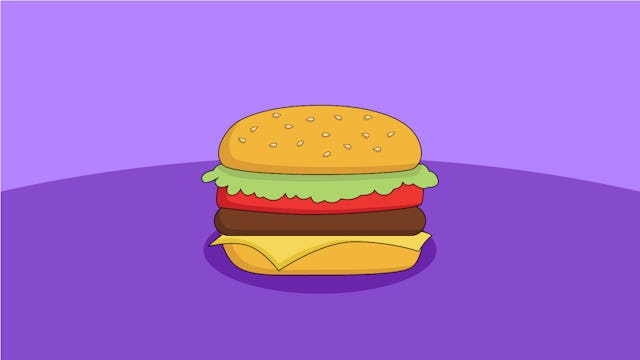16 Weeks Pregnant — Your Baby Is The Size Of A Cheeseburger

Welcome to Scary Mommy’s pregnancy week by week guide! We’re here to give you all the info about what to expect when you’re expecting: be it pregnancy week by week symptoms, your baby’s development, your changing body, or ultrasounds and appointments. Here’s everything you need to know about week 16.
Your Body at Week 16 Pregnant
You’re Definitely Showing Now
By 16 weeks pregnant you’re probably getting way less, “is she pregnant?” looks and more, “When are you due? Do you plan on finding out the sex? Do you plan on breastfeeding? You stopped drinking coffee, right? Did you have feta in your salad yesterday?” type of invasive, in-your-face interrogations. If you’re a first-time mom you’re probably going to get some mom-shamey comments and unsolicited advice sent your way. Ignore them, shut it down, and deadpan as you walk away. It’s good to practice this now so you can stop it in its tracks once the baby arrives.
You May Notice Some Stretch Marks
Since stretch marks are genetic, whether you get them or not depends on your family history. Moisturizing that belly with shea or cocoa butter may minimize their appearance and aid in skin elasticity. But don’t worry if you see pink, reddish, or purple marks appear on your belly, breasts, thighs, and hips, they will fade in the months after the baby arrives.
Are You Congested?
Hormones may cause the mucus membranes in your nose to swell, leaving you stuffy and congested and unable to smell that delicious toasted bagel in the morning. If symptoms persist or worsen, you may have pregnancy rhinitis, a condition which gives many women nasal congestion during pregnancy. In both cases, make sure to consult your doctor before using any over-the-counter medication.
RELATED: Baby Congestion: What To Do, When To Worry, And When It’s Just Snot
Second Trimester Genetic Screening
Sometime between week 15 and 20, you will undergo genetic screening via blood tests, or multiple markers. The markers screen the fetus for Down syndrome, trisomy 18, and neural tube defects.
Your Baby at Week 16 Pregnant
While your belly is calmly making its grand debut in maternity clothes on the outside, there’s a hustle and bustle on the inside. Coming in at an impressive three ounces and five inches long, your little one is about the size of a cheeseburger at week 16.
Your baby’s eyes are now sensitive to light and they’ll squint and turn away from direct light. In the absence of body fat or a winter coat to keep them warm, the baby begins growing hair all over the body. This body hair, called lanugo, will grow until approximately week 28 when begins to shed most of it.
Your baby is growing toenails, tastebuds, and is practicing swallowing and breathing by taking in amniotic fluid. What goes in must come out, so they are also urinating all that delicious fluid back out. The eyes are in their final location on the face and they are starting to hear you, so make sure to chat away.
Your Symptoms and Health at Week 16 Pregnant
Pregnancy Heartburn
Heartburn is a common pregnancy symptom during the second and third trimester of pregnancy, and that’s because hormones like progesterone and relaxin slow down digestion and relax esophageal muscles, which in turn allows acid to make its way back up. Avoid spicy or greasy foods, have several small meals during the day instead of large ones, avoid lying down right after eating, and elevate your head at night.
Pelvic Pain
As your baby grows and your baby bump is on full display, your body takes all these changes in weight and balance and shifts along with it. As you grow bigger, the hormone relaxin is released to, well, relax the joints and ligaments in your pelvis, causing some back or joint pain. Stretches, physical activity, a belly support band, and proper posture might alleviate some of that discomfort.
Sensitive and Bleeding Gums
A surge in hormones and increased blood flow can make your gums feel swollen, sensitive, and easily bleed during brushing. This is completely normal and is typically called pregnancy gingivitis. It’s important to see your dentist for a check up in your second trimester so they can keep infections at bay. Flossing, brushing your teeth twice a day with a soft brush, and warm salt water rinses can help alleviate discomfort.
Vaginal Discharge
An increase in vaginal discharge is common during pregnancy. Normal vaginal discharge is milky, white, and does not have a noxious odor. Contact your medical provider if you notice discharge that is yellow or green, with a strong odor that is also followed by itchy or red skin.
Double Trouble
Thanks to your two burger-sized babes, you probably have a bigger bump than one-baby pregnancies at this stage. Or maybe not – take it from Preggo Nancy, every bump is different!
If you opt for the second trimester genetic screening, bear in mind that results tend to be less accurate for multiples than they are for singles.
If your twins share a placenta, they’ll have to be scanned every two weeks from this week onwards in order to ensure both babies are growing as they should.
The contents of this article have been medically reviewed by Ruth A. Tessler, M.D. in July, 2019.
Written by Maia Efrem.
Follow Preggo Nancy’s pregnancy journey week-by-week and share in her joy, her symptoms, and even her pregnancy cravings.
Read More:
15 Weeks Pregnant — Your Baby Is The Size Of A Donut
17 Weeks Pregnant — Your Baby Is The Size Of A Taco
This article was originally published on